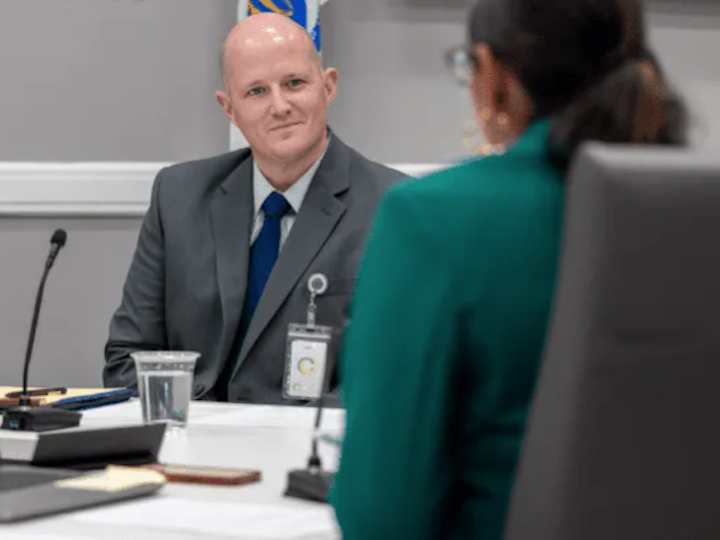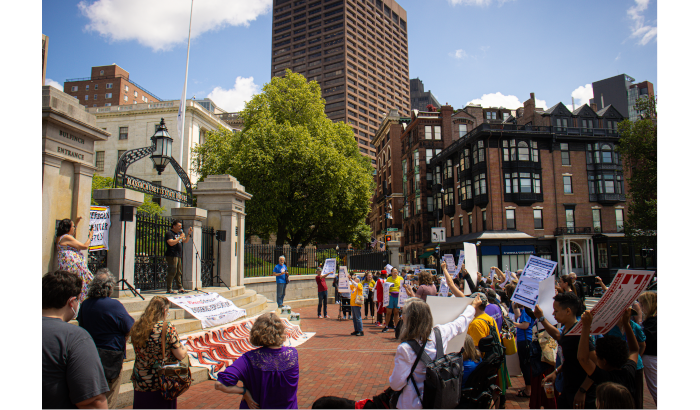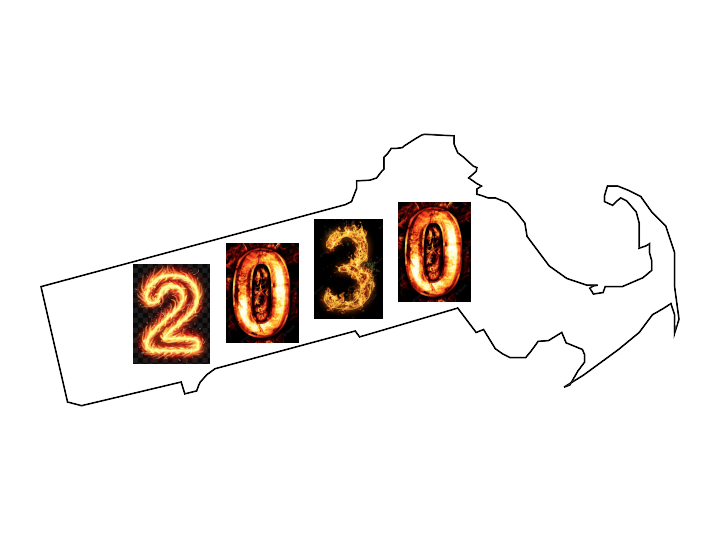The new CCC ED speaks about agency transparency, social consumption, and the road ahead for cannabis in Massachusetts
Two days before Christmas, the Massachusetts Cannabis Control Commission formally announced that Travis Ahern had “accepted the agency’s offer to serve as its next executive director starting in 2025.” The hire came following a yearlong national search and some uncertainty after another candidate was selected then declined the post, but now it’s finally done—and Ahern, who up until this opportunity was working as the town administrator in Holliston, is hard at work at the agency’s office in Worcester.
I asked the new ED about the power structure and partitions at the CCC, as well as transparency and some specific issues like social consumption and lab testing. Below you’ll find my questions and comments in bold, followed by Ahern’s responses. I edited the transcript for clarity, but this is essentially the full exchange …
In the past, even vocally between the former executive director and commissioners at meetings, there have been questions about who is in charge [of the Cannabis Control Commission—the commissioners, or the ED and other hired leaders]. I know there’s a new job description, the one that you applied for, and it was painstakingly developed, but what is your interpretation of who is in charge and really what the job is in that macro sense?
The job description is one thing. I think the other one is the governance charter. So I pulled that from their previous meeting before I went to the interview in October and went through it. And I think that that really is going to highlight your general question, which is … the executive director is setting everybody else up for success in their roles.
The commissioners are going to focus on overarching policy decisions. A lot of the forward-looking long-term planning aspects of the organization need to be going through the commission, and day to day, [the executive director will work with] staff and commissioners alike that are subject matter experts [so they are] in the right position to be successful … opportunities are created … [and] people don’t become siloed.
For example, licensing and permitting enforcement has a very significant job to do. It needs to be done efficiently for end users, for businesses to keep moving through the process. And yet they really need to be working and benefiting from the expertise and research from legal. So the executive director role is really ensuring that all those people have what they need, creating opportunities for them to work collaboratively, and then bringing in external [collaborators] as well. The Cannabis Advisory Board (CAB) is a great example of [external collaborators working closely with the agency] … so I think the executive director’s role is to really make sure that all of those pieces are talking to each other for the benefit of the organization.
How about bandwidth? One thing [people] don’t see from the outside is how huge tasks are moved around. We’ll get to social consumption in a moment, but it really does seem like there’s just an incredible amount [of stuff to do] and now it just seems like there’s going to be more. What’s your role as ED to move things around … especially when resources are not always what you want them to be? Is there anything that you can see that maybe can be shifted, considering how much is going on?
I don’t worry too much. I’m looking at an org chart over here. That’s the stuff that I love that other people don’t. And so my background is why I think it’s a great fit. [There are] a lot of similarities between how a municipality operates and this particular agency. The DPW and the planning department have a lot of reasons that they need to talk to each other in Holliston, and yet they’re never going to do that if people don’t create the opportunities for them to, and that’s where I come in. And so in this instance, like [with] investigation enforcement, you’ve got your research … [and] general counsel. There’s a million topics. They’re gonna hit all those individuals, but they all have day-to-day functions that take up the majority of the bandwidth.
That’s something that I intend to bring and I’m preparing for at the moment. On top of that and the governance document, all of these different things—social consumption, the two-driver rule, vertical integration, all have subject matter expertise internally. They’ve identified externally who they want to be using, and they’re working on solving these issues, bringing it back to the commission overall. So the working group model is almost built into that governance structure. And so that’s another piece that says, Here’s what the executive director does. Here’s what the chair does. And, you know, anything else in between is essentially determined by X, Y or Z.
There are different kinds of transparency. There’s the stuff that is embarrassing, or a pain, or maybe there is a legitimate problem with giving [information to the media and public], but then there’s also the stuff where it should just be out there and obvious. I feel there are issues for the CCC with just getting everything out there in an organized way … communicating in a way that makes things easier. What can be done to improve even the most basic transparency—auromatically, without having to do huge structural overhauls?
[During Ahern’s interview for the job], Commissioner Roy made this point when I started referencing [a particular] document. She said, Just to be clear, you got this document because you looked at our public documents and you found it. I said, Yes, that’s correct.
[Giving the example of his work in Holliston] This is how government should operate—I create a budget document [and] put a ton of data in, but you also have to make it accessible to somebody who’s coming in looking to see the snow and ice budget. And so it’s about the presentation. It’s a great comms team that I’ve been working with here. I’m very excited about that. … At the [Massachusetts Water Resources Authority] advisory board [where Ahern formerly served as the policy and finance director], we found most of our constituents were DPW directors who didn’t like to think about budgets, but we had to get them budget information. So I created a video series. We have the expertise internally at the CCC to do that.
From what I’ve seen, this is a transparent organization. Can we be more proactive so that people see that we’re being transparent? I think it is a great opportunity for us.
Now on to a couple of specific issues, starting with badging [and how some Massachusetts cannabis workers have more than five badges for different areas and buildings of a company, leading to confusion around how many people actually work in the industry at a given time]. I don’t know how hip you are to some of those complaints, but it does seem to be a real bureaucratic web to untangle. I’m sure everybody’s already asking, What’s next? I’m wondering if this is something that can be addressed, because it does seem kind of critical to know who’s working in this industry. Any thoughts on badging and employee numbers?
I’m going to skip over the badging because I’m not going to tell you I’m an expert on all these topics at the moment. I’m still reading up. But I think from the employee standpoint, employee safety became a major issue in the last year, and I think that the CCC has been very responsive to that. … So I think there’s opportunities in some of those things to change the way that [certain things] are being handled, obviously, from an employee perspective. … I think there’s room to improve.
The big topic is obviously, as far as a lot of operators are concerned, is lab testing. There are reported plans for a class action lawsuit against some major manufacturers and cultivators over [alleged] lab fraud. The CCC recently made efforts to curb lab testing that were both praised and derided, [with some stakeholders saying the changes] are not enough. Do you see this as something that is a major problem in the industry? Is it something the CCC … can get on top of? Where do you take it from here?
Absolutely. Some of the things that I’ve looked at—obviously the number of Independent Testing Labs [ITLs] has increased substantially since the beginning. I think that’s important. Lab shopping and all these different things have come up, and the CCC has been responsive. The administrative order that goes into effect on April 1st, 2025 is [one example]. [Another one] of the things the CCC mentioned is getting THC percentage into the open data platform. … I think the investigations and enforcement team is going to be the biggest component of that for the CCC.
So the big one, of course, the positive one here is social consumption. What’s it going to be like? I see this as major, almost like 2.0 of the whole thing. Kind of a clean slate as well. What are your thoughts going into it? What do you think of the proposed regulations? What’s this opportunity look like for you?
It’s going to be an exciting part of the job, coming in for this. For people who sort of say, We’ve been reading coverage. Why are you going in this? To me, [they’re] looking back and I’m looking forward. Everything since Chapter 180 is going in the right direction for the industry and … social consumption is obviously a major component of it. Indoor combustion prior to Chapter 180 was just not going to be a reality. … It can be as well written as it is right now and favorable to the industry because of Chapter 180.
In my Holliston experience, we had a conversation, where we have a number of different cultivation and manufacturing businesses. We’ve also now allowed delivery, which is going to be rolling out. And I think social consumption is going to be something that’s very interesting. Retail doesn’t make sense in a town like Holliston—there is not retail there to begin with. We had industrial parks, so the town moved ahead with allowing cannabis. But retail didn’t make sense. So they made the decision they made. They allow delivery … and now social consumption as well. Whether it be the supplemental [license type], where those [existing] businesses directly take that opportunity, that’s phenomenal, then additionally, events can be anywhere. I think that it’s going to be interesting to see. And I think it’s going to be competitive for towns that aren’t supporting this because people are going to go and have these opportunities in the neighboring town.
It’s a really interesting one compared to the past zoning discussions that have happened on the local level. And then from the business perspective … The possibilities that you can think of today are only going to expand when you consider some of the creativity and the innovation in Massachusetts cannabis. And so I’m excited for the CCC to roll this out and then I’m excited to see where it goes. It’s going to evolve over time.
I don’t like to apples and apples compare cannabis to alcohol, but I’m a person who quit drinking quite a while ago, just as a lifestyle choice, and it’s always good to have other options. … And I think that communities are going to embrace it, it’s going to really set the industry apart in Massachusetts compared to some other states that have impacted the price of cannabis in Massachusetts—Connecticut, Maine, etc. How is Massachusetts going to remain competitive regionally? I think this is a major step forward for the state.
So are you a gummy guy, director? When those lounges open, will you be joining us?
I would be happy to join you. I probably won’t be consuming. I voted for it in 2016, I’ll say that, and so there’s a variety of reasons that I won’t get into that I won’t partake with you, but I will be more than happy to be there. I’m excited to see where the first one will be.
And just to be clear, it’s not all sunshine and rainbows. There will be pushback. There will be, you know, dips in the road. But I think overall, this is going to be very successful for Massachusetts, and I think the CCC is going to be there and for the betterment of the industry, be there to show that safety and health are being seriously considered so that when towns or neighbors of locations push back, the CCC has the answers that the businesses need to be able to say, Look, this is being done responsibly. And that is going to be where the industry and the CCC can really work together to move this forward.
This interview initially appeared on talkingjointsmemo.com and was republished here with permission.






